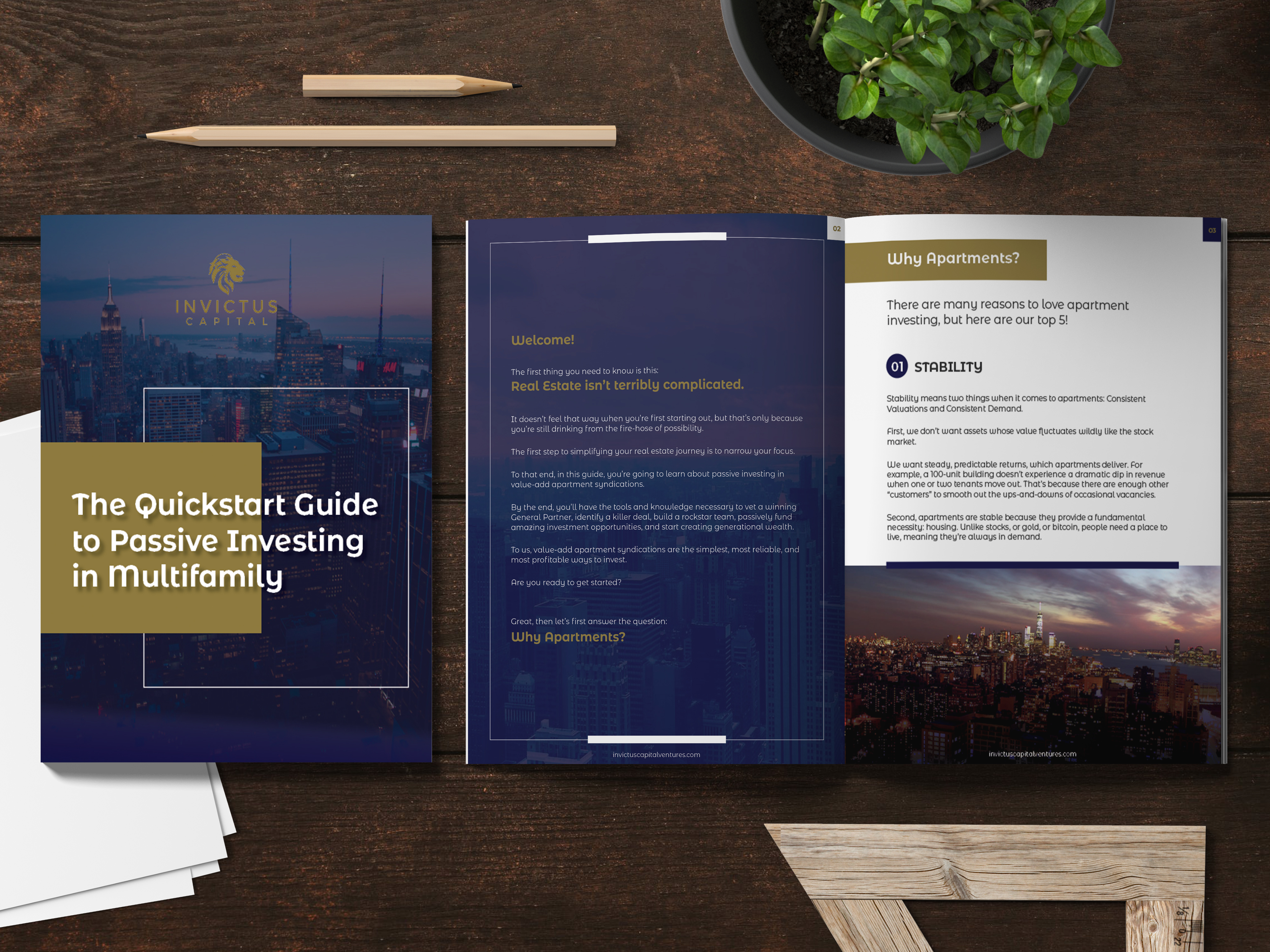Okay, you’ve watched all the videos and read all the articles and you’ve come to the conclusion that passively investing in multifamily real estate is in alignment with your long-term financial goals. But hold on, don’t make the same passive investing mistake most new investors make.
If you want to be successful, it’s important to first dismiss the idea that being passive means you won’t have to do any work. Unfortunately, that’s just not the case.
True, you’re not going to be expected to fix a broken toilet or answer tenant phone calls in the middle of the night when the boiler goes out, in fact, over the life of the deal, it’s very likely you won’t do much of anything besides collect quarterly distributions.
The people responsible for all the daily heavy lifting, executing the business plan and ensuring those distributions come in like clockwork are the General Partners (aka the Syndicators).

Now, let’s say your Syndicator isn’t very good. They’re slow to respond to your emails, and when they do finally get back to you, they never seem to have clear answers or insights as to the state of the asset in relation to the business plan.
In fact, from what you can tell from the occasional status updates they do deliver, it doesn’t really seem the deal is keeping pace with the initial business plan. For whatever reason the unit flips are taking longer, running a bit over budget, and not bringing in the projected rent premiums.
Sure, the General Partners always have a pocketful of nice-sounding justifications (or excuses), but the returns are lackluster and you’re starting to get that sinking sensation in your gut that maybe you’ve blown a lot of money on this particular investment.
Now you’re just hoping you don’t lose too much.
Oof, this is a tough place to be. These are the types of experiences that turn people off from investing in real estate entirely, which is a shame, because there are fantastic returns to be had out there, with the right team.
So the question becomes: How do you find the right team?
And this is where the work of a passive investor begins.
Common Passive Investing Mistakes
The Deal
The passive investing mistake most newbies make is to spend too much time analyzing and worrying about specific deals.
This is a waste of time for one massive reason: Numbers don’t lie, but they can be used to mislead.
The problem is, anybody can tweak the numbers to show a stellar 10% cash-on-cash with a 20% IRR after 5 years. Make a couple of liberal assumptions about how much you can bump rents, how low expenses will be, and how you can avoid certain Cap-Ex items, and suddenly a dud of a deal can start to shine.
Sure, you need to have a solid understanding of the business plan the GP plans to execute, but don’t rely too heavily on the numbers.
Click here to brush up on the 4 most critical numbers you need to know when analyzing a deal.

Wait, so if the numbers aren’t the end-all, be-all…what should we be looking for?
To us, it all comes down to track record and fit.
First, is this sponsor’s style of communication and investing similar to mine? If it’s not a good fit, there’s going to be friction.
If you’ve ever interviewed somebody for a job, or been on a first date, you know how difficult this step can be.
Track record is a bit easier to peg down, because success doesn’t happen in a vacuum. There’s usually a trail you can follow back to the beginning. If there’s no trail, well, that’s maybe a red flag.
With all that said, here are some ways to vet a prospective syndicator.
The Track Record
How have they performed in the past?
If you’re getting into a deal with a syndicator that’s done multiple deals, it’s great to get as much information on how these deals performed.
Pro Tip – don’t just look at how the deal performed. Look at how the deal performed relative to the original business plan.
Did the syndicator anticipate 20% IRR after a 5-year-old, but instead delivered 17% after 7? Well, that’s maybe not a terrible return, but it’s suspect when compared against the original objective.
This could be a sign that this syndicator has a tendency to over-promise and under-deliver.
From our experience, the syndicators passive investors are most satisfied with are the ones that exceed their projected returns.
Full Cycle
Some syndicators are newer to the game, which isn’t necessarily a bad thing, but it might mean they haven’t gone full cycle on a deal. Successfully exiting a deal is when investors will typically see the vast majority of their returns, so if your syndicator is new’ish, they might be lacking this valuable marker of success.
Supposing they haven’t gone full cycle, the next best thing is to look at their refinances.
Refinances are a good mid-point check-in on the forced appreciation of the asset and whether or not it’s on pace to achieve the initially projected returns.
No Cycle
Everybody starts at the beginning. Some of the best rockstar syndicators of the future, are just cutting their teeth now.
Does that mean you should give them a pass while they hone their skills?
Maybe, maybe not.
For us, it really comes down to their previous career and experiences. Some skills and experiences are worth more than others.
A kindergarten teacher is probably not going to have as much relevant information as somebody who worked in the financial sector underwriting and executing budgets.
A truck driver might not be as poised to execute a successful deal as a successful business owner with experience managing a crew of employees.
If your syndicator is new to the game (perhaps it’s a family member or friend looking to get into the industry and do their first deal), weigh their potential to execute the deal against their past relevant experience.
The Team
It’s not a Me-game, it’s a We-game
Your operator might be the best thing since sliced bread, but there’s no way they are going to be managing every aspect of a deal.
Nobody in this business (or life) gets anywhere on their own.
You can tell a lot about the potential success of a syndication by the team assembled around the GP.
That’s not to say they need to have a team of 50 employees (most syndicators run fairly lean), but there are a couple key members you should identify.
First, the property management.
Nothing breaks a deal faster than poor property management. Nothing.
So it’s important to know, is this the property management handled by a third party or in-house? If the asset is being outsourced, then does the syndicator have experience with this particular company? What’s their track record? Do other investors have experience with this property management team, and if so, what are their thoughts?
After the property management, the next team member you’ll want to see is the asset manager. This is the person who is going to oversee the functioning of the deal at the highest level and they are important because they will be responsible for communicating with investors throughout the life of investment.
At this point it’s critical you and this individual find good fit when it comes to what makes for successful communication.
What they consider to be excellent communication needs to be in alignment with your expectations otherwise you’ll find yourself throughout the life of the investment wondering what the heck is going on with your money.
Just by asking some probing questions you can avoid this simple passive investing mistake.
The Fit
At the end of it all, you should ask for references. Ask to speak with others who have invested in at least one deal with the syndicator (or, if they are brand new, ask to speak to some professional references).
This is a critical step and we highly recommend you do not skip out.
Sure, nobody enjoys making a phone call to check up on somebody else, but here’s a little tip we’ve learned from interviewing countless new hires and we find it relevant to vetting syndicators: If the person giving the reference isn’t absolutely trying to sell you on the benefits of working with that syndicator, then it might be wise to walk away.
Think about this, if you invested your money with a syndicator and they exceeded your expectations in terms of return and communication, wouldn’t you be absolutely psyched to recommend them to others? Of course you would!
Congrats, you’ve avoided the most common passive investing mistake!
The right operator can turn a good deal into a fantastic deal. Whereas the wrong operator can take a great deal and flush it down the toilet.

Be sure you feel comfortable with your syndicators’ track record and their team before hopping into their deal. It’s the most important thing you’ll do as a passive investor and the best way to avoid the most common passive investing mistake.


